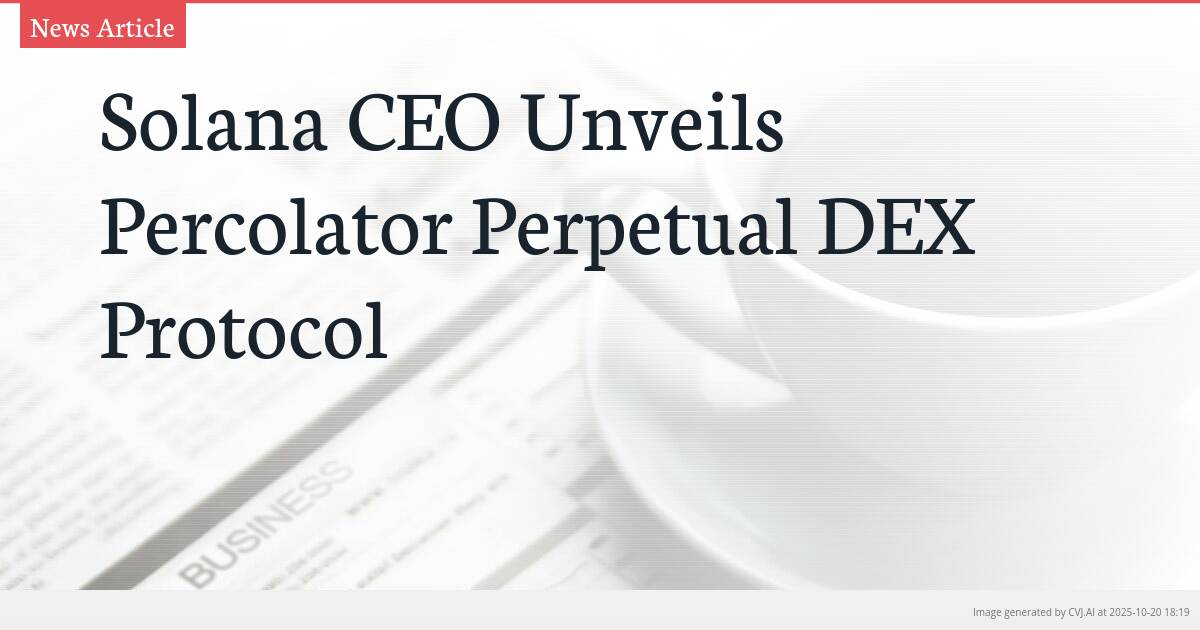Introduction
Solana Labs CEO Anatoly Yakovenko has announced plans for a new perpetual decentralized exchange protocol called Percolator, marking a strategic response to growing competition in the decentralized derivatives market. The sharded perpetual exchange protocol, built on the Solana blockchain, aims to capture market share following recent success stories like Hyperliquid and comes just two months after a VanEck report highlighted Hyperliquid’s growth at the expense of Solana and other major chains.
Key Points
- Percolator will implement sharding technology to enhance scalability and performance on the Solana blockchain
- The announcement follows a VanEck report that documented Hyperliquid's market growth impacting Solana and other major chains
- Perpetual futures contracts allow continuous trading without settlement dates, providing greater flexibility for cryptocurrency speculation
Solana's Strategic Move into Perpetual Futures
Anatoly Yakovenko, co-founder and CEO of Solana Labs, has positioned Solana to directly compete in the rapidly expanding perpetual DEX space with the announcement of Percolator. This new protocol represents a significant strategic pivot for the blockchain platform, coming precisely two months after investment firm VanEck documented Hyperliquid’s market growth occurring at the expense of Solana and other large chains. The timing suggests Solana is responding to competitive pressures in the decentralized finance landscape, particularly in the derivatives sector where perpetual futures have emerged as a dominant trading instrument.
Percolator will function as a decentralized trading protocol specifically designed for perpetual futures contracts, enabling traders to speculate on cryptocurrency prices without the constraint of expiration dates. This feature distinguishes perpetual futures from traditional futures contracts and has proven particularly popular in cryptocurrency markets where price volatility makes indefinite trading positions attractive. The protocol’s development follows the success of existing platforms like Hyperliquid and Astar, indicating that Yakovenko and Solana Labs are seeking to capture a portion of this growing market segment.
Technical Innovation Through Sharding Architecture
The Percolator protocol will implement sharding technology to enhance scalability and performance on the Solana blockchain. Sharding involves partitioning the network into smaller, more manageable pieces called shards, each capable of processing transactions independently. This architectural approach addresses one of the critical challenges facing decentralized exchanges – the ability to handle high transaction volumes without compromising speed or increasing costs significantly.
By building Percolator as a sharded perpetual exchange protocol, Solana aims to leverage its existing high-throughput capabilities while adding another layer of scalability specifically optimized for derivatives trading. This technical differentiation could provide competitive advantages in processing perpetual futures contracts, which typically require continuous position management and frequent margin calculations. The sharded architecture represents Solana’s attempt to overcome limitations that have hampered other DEX platforms during periods of high market volatility.
Market Context and Competitive Landscape
The perpetual DEX space has witnessed remarkable growth recently, with platforms like Hyperliquid demonstrating that decentralized derivatives trading can attract significant volume away from established chains. The VanEck report referenced in Yakovenko’s announcement specifically highlighted how Hyperliquid’s expansion came at the direct expense of Solana and other major blockchain networks. This competitive dynamic underscores the urgency behind Solana’s entry into the perpetual futures market with Percolator.
Yakovenko’s move follows a pattern of crypto founders launching DEX protocols in response to market opportunities, with Hyperliquid and Astar serving as recent success stories that likely influenced Solana’s strategic direction. The decentralized exchange sector has become increasingly competitive, with perpetual futures representing one of the fastest-growing segments within DeFi. By introducing Percolator, Solana not only addresses a competitive threat but also positions itself to benefit from the continued expansion of decentralized derivatives trading.
The announcement signals that major blockchain platforms recognize the strategic importance of controlling derivative trading venues, which often generate substantial fee revenue and drive ecosystem activity. As perpetual futures continue to gain popularity among cryptocurrency traders seeking leverage and flexible position management, protocols like Percolator could become critical infrastructure components determining which blockchain networks capture the most value from the evolving DeFi landscape.
📎 Source reference: cointelegraph.com

